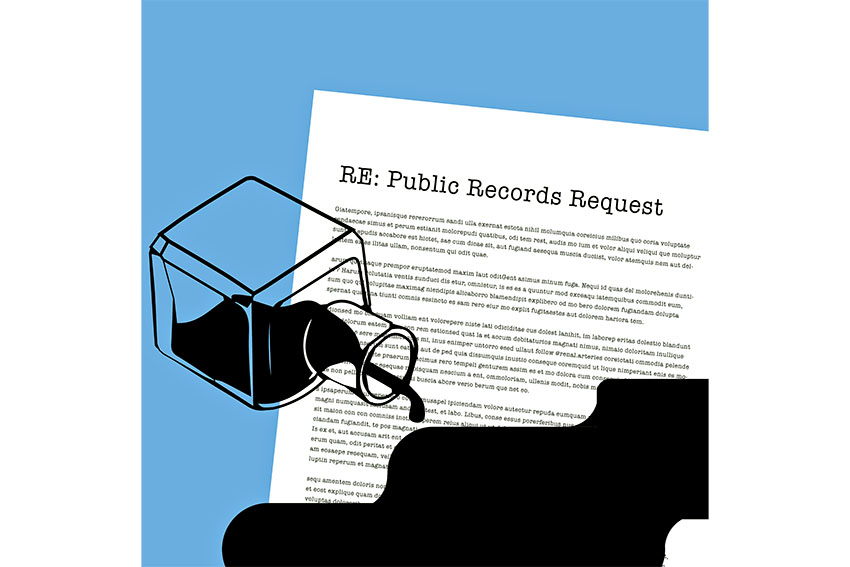Last September, I received a Freedom of Information Act request confirming professor Coleman Hutchison had violated the University’s sexual misconduct guidelines. I requested something called a findings report from the University’s Open Records Office. The report I received included a summary of the investigation and its findings, as well as the Provost’s recommendations for Hutchison’s discipline.
I wrote a column in September criticizing UT for how hard it is to find information about professor misconduct. I argued that students deserved to know if their professors have treated other students inappropriately, and they shouldn’t have to file a FOIA request to get this information. But I was glad students could get the information somehow.
When I wrote my initial piece, I thought UT released findings reports for all cases of professor misconduct. While reporting, I kept a list of names in my desk drawer. Almost everyone I interviewed had a story about harassment. Everyone knew about a professor with a reputation, a professor who made students uncomfortable. I planned to use what I had learned about findings reports to look into other cases of misconduct to verify if my list had any basis in UT’s records.
Last month, I picked the four worst stories from that list and filed requests with UT’s Open Records Office asking for findings reports involving those four professors. Though the requests were almost identical — only the names were different — three of the requests were rejected by the Open Records Office. The office responded to my final request saying there was no record of an investigation into the fourth professor.
For the other three requests, UT claimed that the information I requested was confidential. The University filed a brief with the Attorney General’s office requesting a ruling to confirm the University was not legally required to release the information to me.
I didn’t understand why these requests — which were identical to the request I filed in September — were rejected. I tried to get information about three professors I’d been warned about, and the system didn’t work.
The Open Records Office basically acts as an intermediary between UT’s archives and the general public. As a public institution, UT is bound by the Texas Public Information Act to release certain information upon request. When the Open Records Office receives a request, they’re tasked with finding the relevant document — if it exists — deciding how much of it they can release and sending that information to the requester.
The Open Records Office’s goal is to release as much information as is legally possible. Some information is confidential and can’t legally be released, such as medical or personnel records.
Crucially, the Open Records Office is only responsible for releasing documents that already exist. It’s not required to compile data or create any documents in order to fulfill a request. Findings reports already exist for professors who have been accused of misconduct, so requesting them from the Open Records Office should work.
But determining confidentiality in issues of misconduct is difficult.
A findings report can be deemed confidential — and your request denied — for one of three reasons.
Reason 1: The report was unfounded, and the professor was cleared of misconduct allegations. This makes sense. Professors shouldn’t be subject to judgment for misconduct the University never penalized them for.
Reason 2: The case is ongoing, and the issue of guilt is not yet decided. This seems reasonable. The professor may be in the clear.
Reason 3: The professor violated the conduct guidelines, but the findings report itself contains enough detail about the incident that it could reveal the identity of students who were involved. This is where it gets tricky.
The University of Texas is bound by the Family Educational Rights and Privacy Act, or FERPA. FERPA exists to protect the privacy of students and is the main reason why a request such as this would be denied. If the information included in the findings report — the semester, the year, the class, anything like that — could be used to identify the student in question, UT risks violating federal law.
Considering these privacy concerns, I’m surprised any of these reports can be released.
Students deserve to know if their professors have a history of mistreating students, even if the information is limited. As long as professors who have violated sexual misconduct or harassment guidelines remain in teaching positions, the issue becomes a safety concern.
The Open Records Office can’t create documents that don’t already exist, and UT can’t risk exposing the identity of a student by releasing the findings reports. UT can make this information accessible.
Create a document to supplement the findings report. Make it as simple as possible, just one piece of paper. All you need to include is the name of the professor and the offense, and you only need to release it if the professor actually violated a policy. Let the ongoing investigations and the unfounded accusations stay confidential, but tell us what we need to know to feel safe in our classes and our office hours.
Students only need to know if a professor of theirs — maybe a professor they’re working closely with — has a record of misconduct involving students. They need to know what they may be getting themselves into.
When I first wrote about sexual harassment, a University official told me the administration wasn’t interested in protecting professors from the consequences of their own actions.
This might be true, but our current system lets a lot slip through the cracks.
Students need to know if their professors have a record. All we need is a single sheet of paper.
Anderson is a history and Plan II junior from Houston. She is the editor-in-chief.





















